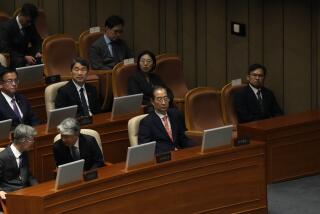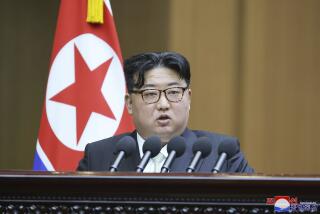S. Korea Opposition Warns Regime Could Be Toppled; National Police on Alert
SEOUL, South Korea â Kim Young Sam, leader of the opposition Reunification Democratic Party, warned Monday that the government will be overthrown if it continues on its present course, and the government promptly put the national police on alert throughout the country.
At the same time, Lee Jong Ryool, a spokesman for President Chun Doo Hwan, said in an interview that the government will be more flexible in dealing with the opposition and in carrying out democratic reforms.
Kim, the opposition leader, warned at a press conference that if President Chun goes ahead with the convention of the ruling Democratic Justice Party scheduled for Wednesday, it will be âcrossing a bridge of no return.â
Activist supports of the opposition have called for demonstrations throughout the country to coincide with the convention. According to wire service reports, police rounded up more than 2,100 persons on security related charges early today, their normal strategy to curtail planned street demonstrations.
At the convention, the ruling party plans to nominate its chairman, Roh Tae Woo, 54, as its candidate to succeed Chun as president next February.
âThe convention is not a simple political function of a party,â Kim said. âIt means that the present regime is . . . turning its back on the ardent national aspirations for democracy and constitutional change.â
He said the government and the ruling party âwill be digging their own graves by holding the conventionâ and added: âAn all-out national struggle would be unavoidable to reject the regime. . . . My party will stand in the very vanguard of that struggle.â
The authorities warned that any action outside the law during the planned demonstrations Wednesday will be dealt with harshly.
Home Minister Koh Kun and Justice Minister Chung Hae Chang issued a joint statement warning that âthese clearly illegal gatherings must be called off and self-restraint must prevail.â
All 120,000 members of the national police were ordered to go on full alert today to prevent any street violence.
Reasons for Protest
The demonstrations scheduled for Wednesday were called to protest the presidentâs April 13 decision halting debate on revising the authoritarian 1980 constitution and the cover-up of the death, in January, of a student being tortured by the police.
Lee, the presidential spokesman, described as final Chunâs decision to freeze debate on revising the constitution until after the Olympic Games here next year. He said the presidential election law can be changed only as the result of negotiations with the opposition, which so far has refused to get involved.
But on the possibility of other reforms before the Olympics, Lee said, âOh, sure--the press law and other things.â
Newspaper publishers are studying possible revisions to the press law, and if they can reach an agreement, the National Assembly can easily approve them in a regular session that will begin Sept. 20, Lee said.
But the abolition of government licensing of mass media organs, which Chunâs critics have urged, will not be considered, Lee said.
He cited as an example of other reforms a plan to take the first step in replacing presidential control of local governments with local autonomy. He said a law will be enacted this year to allow local assembly elections. At present, all local government officials are appointed by the central government.
To back up his prediction that Chun and his successor will pursue a more flexible course of democratic reform, Lee pointed to Chunâs overhaul of the Cabinet in late May and said that ânew people bring in new ideas.â
In addition, âas the government changes hands, there will be pressure for flexibility,â he said. The Olympics, too, will force a greater âemphasis on national reconciliation and harmony,â he said, adding, âWe need some kind of consensus to complete successfully the staging of the Olympics.â
Lee predicted that Roh, in his acceptance speech Wednesday, will renew Chunâs commitment to reopen constitutional debate after the Olympics.
With the ruling party lacking the two-thirds needed in the National Assembly to amend the constitution, âcompromise will be necessary even after the Olympicsâ for amendments, Lee said.
Attempts to revise the constitution ran aground when the government insisted on a parliamentary form of government and the opposition insisted on a presidential system and direct popular elections. Both refused to compromise.
The opposition party contends that the present system, under which an electoral college chooses the president, is rigged in favor of the government. It says it will boycott the presidential election.
Lee said Chun plans to travel, lecture and write his memoirs after stepping down next Feb. 24, and as chairman of a State Advisory Council, will give âadvice and counselâ to the next president.
As to whether Chun might retain a role in the ruling party, Lee said: âI cannot comment. I donât know.â
More to Read
Sign up for Essential California
The most important California stories and recommendations in your inbox every morning.
You may occasionally receive promotional content from the Los Angeles Times.










